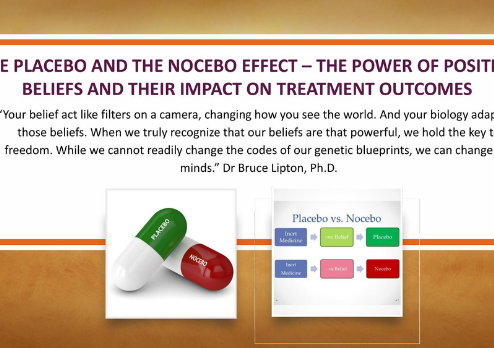
Placebo is used in several fields of medicine, as a diagnostic tool or to reduce drug dosage.
The Placebo Effect – The Power of Positive Beliefs
The placebo effect is one of the clearest demonstrations of how thinking affects the body. Believing that someone has given you an effective cure for a problem - although they might have only given you a sugar pill or waved something over your head - can not only cause emotional calming, but actually change the physical experience within the body.
In a more common example of how thinking influences the body, have you had this experience? You went to bed late one night during the work week, looked at the clock, calculated the hours until you had to get up, and thought to yourself, “I am going to be exhausted tomorrow.” In the morning, you felt miserable as you climbed out of bed and dragged yourself to work. All day long you reinforced this feeling by repeating “Am I tired?” Sounds familiar?
Now replay the same scene, but this time it happens when you are on vacation. You stay out late into the night, dancing, partying. Going to bed, you anticipate the exciting prospects of the next day – new adventures, new sights, and new people. You remember that some people thrive on only a few hours of sleep a night and, armed with this thought, you retire happily. The next day you leap out of bed ready for the magic, barely giving a moment’s reflection to the amount of sleep you have had. Your thoughts have energized your body.
Nocebos – The Power of Negative Beliefs
The term Nocebo comes from the Latin “to harm.” The Nocebo effect is in fact an expectation about negative treatment outcomes. Almost a polar opposite to the better-known placebo effect, it works through our negative assumptions and conditioning.
For example, there is a high risk that a cancer patient who has always experienced nausea after chemotherapy will expect this adverse side effect, and the anticipatory anxiety, (will then), produce the negative expectancy.
In medicine, the Nocebo effect can be as powerful as the placebo effect, a fact that you should keep in mind every time you step into a doctor’s chamber. By their words and their demeanor, physicians can convey hope-deflating messages that can be avoided.
An example is the potential power of the statement: “You have only six months to live.”
We are aware of the Nocebo suggests that physicians, parents, teachers and media widely use to program us to believe we are powerless. I suppose we all are now getting our daily doses of Nocebo ever since the beginning of this pandemic. Fear is a great way to control people. The Nocebo phenomenon is so evident now when we watch the mainstream media, read newspapers and follow the related posts on the social media.
Nocebo effect is possibly more powerful than the common flu virus in that it compromises your immune system before you have even had a chance to catch the actual virus. And that is why you should avoid the Nocebo effects of Coronavirus at all costs.
You must have heard from many doctors and wellness experts that if you do not believe in a treatment, regardless of good treatment, it will not work on you. Your recovery gets impacted because that is the message you are sending to your brain.
The Nocebo effect can vary across cultures and countries. Here is an example of pill size: “a small pill is really strong, and that is the reason why it is so small. These beliefs also shape the Nocebo and Placebo responses.”
So be the Placebo and not the Nocebo. Use the current situation of pandemic to go viral with the idea that communities can support each other and work together to eliminate threats against humanity – not just the Coronavirus, but all Nocebo-like thought forms.
You can view this video: